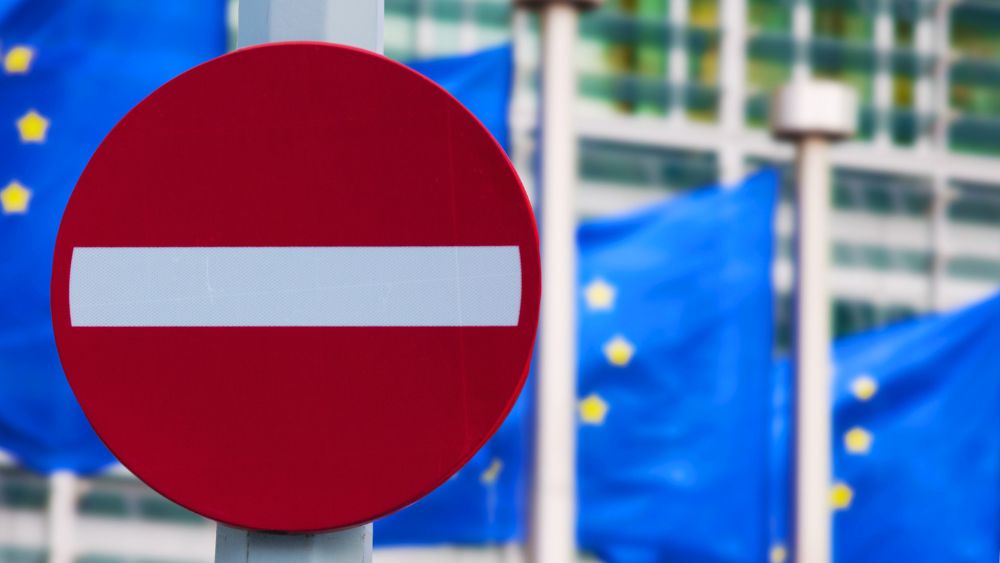Following the package of sanctions adopted in May, the EU imposed a new set of sanctions against Russia and Belarus starting 19th July aiming to further increase pressure on the country to reach a peace agreement with Ukraine, cutting Russia's energy revenues, hitting Russia's banking sector, further weakening its military‑industrial capacity, strengthening anti‑circumvention measures, and holding Russia accountable for its crimes against Ukrainian children and cultural heritage.
Sanctions on Russia
The EU has imposed a new package of sanctions against Russia for its aggression against Ukraine and the ongoing war in which the entire area is embroiled. This comprehensive set of measures covering different areas (energy, finance and accountability, trade, etc), includes several that directly affect trade in goods:
- a cap on the price of oil, and introduction of an automatic and dynamic mechanism for its review in the future to ensure that the cap is always 15% lower than the average market price for Russian crude in the previous period of six months, resulting in both predictability for operators and downward pressure on Russian energy revenues
- restrictions on imports into the EU of fuels made from Russian oil, even if it has been refined in third countries. This will prevent Russian crude oil from reaching the EU market in any form
- additional bans on exporting certain critical technology and industrial goods, such as those used to produce drones, to Russia
- other economic sanctions
Oil price cap
The EU has lowered the price cap on Russian crude oil from $60 per barrel to $47.6 in a dynamic mechanism that will remain 15% below the average market price and will be adjusted every six months.
Import ban on Russian petroleum products refined in third countries
From 21 January 2026, it is prohibited, directly or indirectly to acquire, import or transfer to the EU petroleum products classified under CN[1] code 2710 obtained in a third country from crude oil classified under CN code 2709 00 originating in Russia. These products come mainly from India and Turkey.
At the time of importation, importers shall provide evidence of the country of origin of the crude oil used for the refining of the product, unless the product is imported from a partner country listed in Annex XXIV to Regulation (EU) 833/2014.
Ban on exporting certain industrial products and critical technologies to Russia
The EU has provided Member States with a tool to control shipments to third countries and allows them to stop and investigate suspicious shipments in case of risk of diversion to Russia and avoid circumvention of sanctions.
Restrictions on new elements and technologies linked to Russia’s technology and military
The EU has added to the list of export bans to Russia, new items that may facilitate Russia's military and technological advancement or support the development of its defense and security sectors:
- chemical constituents used to produce solid-state propellants of CN codes 2929 10, 2850 00, 2921 49 among others and,
- computer numerical control (CNC) machine tools used to produce fighting equipment (Kh-59 cruise missiles, unmanned aerial vehicles, helicopter components and tanks) of codes: 8205.59, 8456, 8757, 8458, 8459, 8466 and 8485.
An authorization shall be required for the export to any third country other than Russia of products and technology listed in Annex VII to Regulation (EU) No 833/2014, which may contribute to Russia's military and technological improvement, or to the development of its defense and security sectors, if the exporter has been informed by the competent authority of the Member State of export that such items are or may be intended, in whole or in part, to any recipient located in or for use in Russia.
Export bans on products that enhance Russian industrial capacities
The list of products prohibited for export to Russia is extended to:
- machinery and appliances used in the energy sector, such as gas turbines,
- various enzymes and chemicals, used as raw materials in industry,
- certain metals such as refined copper and articles of copper, aluminum and articles of aluminum, and articles of steel; and
- plastics.
Other economic sanctions
The new sanctions package includes additional economic measures and other measures to counteract circumvention of sanctions and third-country support to Russia:
- Ban on transactions on Nord Stream 1 and 2: No EU operator can participate in any transaction concerning the Nord Stream pipelines. They are currently suspended, but Russia intends to resume them. This transaction prohibition also covers the purchase of natural gas transported through any of the pipelines.
- Increased list of sanctioned vessels: 444 vessels in Russia's shadow fleet are now listed by the EU and are subject to a ban on access to ports and a ban on receiving services.
- Full‑fledged listings ‑ asset freezes and travel bans throughout the shadow fleet value chain. These target both Russian and international companies managing shadow fleet vessels, traders of Russian crude oil, as well as a major customer of the shadow fleet, a refinery in India with Rosneft as its main shareholder.
- Ban on certain banking operations: The EU has banned the provision of services and software to the Russian government and Russian companies, so it will now include key types of banking software.
- Inclusion of 26 entities (15 entities established in Russia, 4 in Türkiye and 7 in China/Hong Kong) in the list of Annex IV to Regulation (EU) No 833/2014 including companies which are military end-users, form part of Russia’s military and industrial complex or which have commercial or other links with, or which otherwise support Russia’s defense and security sector.
- The transit ban on dual-use goods and technology linked to Russia’s military, defense and security sectors is extended to 8 Combined Nomenclature (CN) codes from the list of economically critical goods, including two directly related to the energy industry. These goods can no longer transit through the territory of Russia when exported from the EU to third countries.
New restrictions for Belarus
This package of measures also directly affects Belarus:
- the prohibition of the acquisition of arms and related material, including:
-
- weapons and ammunition,
- military vehicles and equipment,
- paramilitary equipment and
- spare parts for the items mentioned
- the addition of a general provision for high-tech items,
- the transformation of the ban on specialized financial messaging services into a total ban on transactions, and
- the addition of measures to protect Member States from investor-state arbitration.
- additional restrictions on the export of sensitive goods, technologies and industrial goods.
Further information:
- EU Trade Press release - EU adopts 18th package of sanctions against Russia
- Questions and answers on the 18th package of sanctions against Russia
- Sanctions adopted following Russia’s military aggression against Ukraine
- Council Regulation (EU) 2025/1494 of 18 July 2025 amending Regulation (EU) No 833/2014 concerning restrictive measures in view of Russia’s actions destabilizing the situation in Ukraine
-
CN is the Combined Nomenclature is the 8-digit coding system for classification of goods in the European Union, based on the Harmonized System of the WCO ↑

